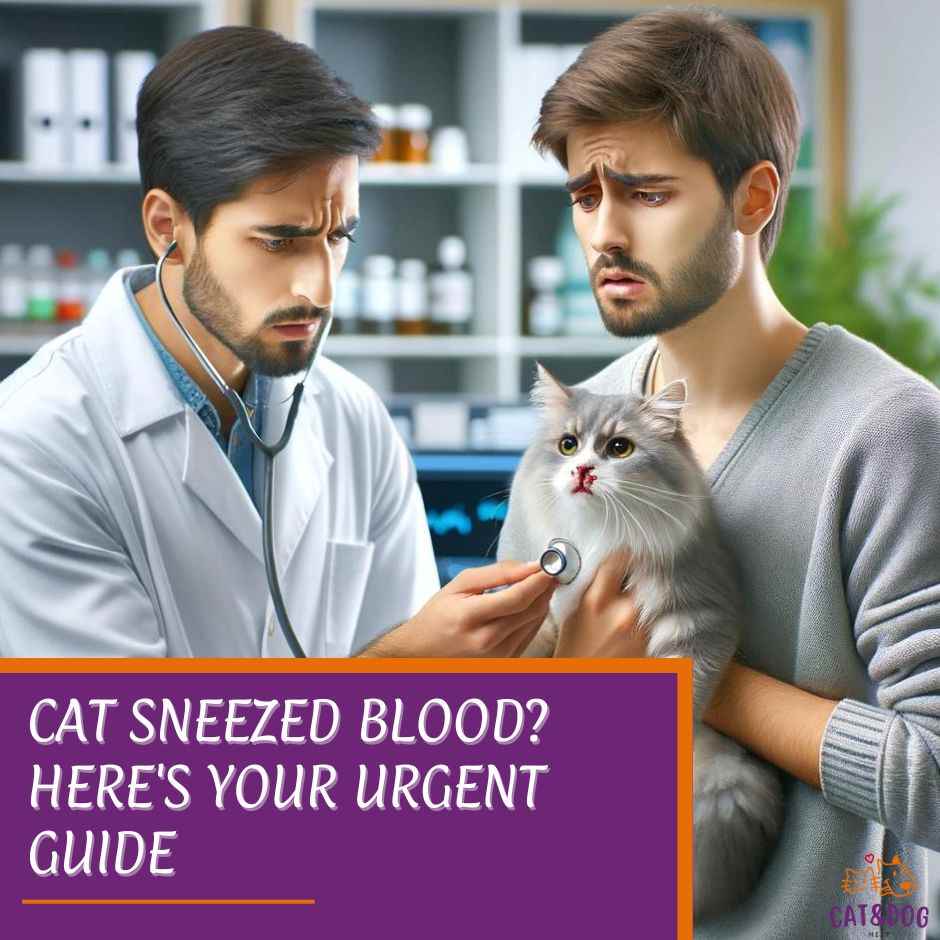Discovering that your cat sneezed blood, also known as a cat bloody nose or epistaxis, can be quite alarming.
Your concern is well warranted—when a cat experiences a nosebleed, also known as epistaxis, it could signify a range of underlying issues, from minor to severe cases, such as poisoning from rat poison.
The condition, medically known as epistaxis, is caused by the blood vessels in the nasal passage breaking, bleeding, and leaking out the nares, or nostrils. (1)
The bleeding itself can cause some mild irritation leading to a bout of sneezing.
Though it may be a scary situation, remember that understanding the potential causes, such as a cat nose bleed or epistaxis caused by feline calicivirus would help a lot for the vet visits.
Also knowing the immediate steps to take, including seeking veterinary care and examining the nasal cavity and sinuses under anesthesia, can help manage your pet’s health effectively based on your cat’s condition.
In some cases, a nosebleed may be caused by a foreign object, such as blades of grass, lodged in the nasal cavity, so it is important to seek medical attention to determine the underlying cause.
If you find yourself in this situation, the first order of business is to stay calm and observe. Is it a one-time occurrence, or is sneezing blood a frequent event for your feline friend?
The frequency and accompanying symptoms can offer clues about the severity of the condition, including coughing.
Immediate gentle care can help manage the situation, but it’s important to seek veterinary advice if your cat’s sneezing won’t go away.
You can consider the vet visit if other symptoms such as a runny nose, eyes, or sneezing cat occur along with the most common cause of persistent sneezing in cats, an upper respiratory tract infection caused by feline herpesvirus and feline calicivirus. (2)
A professional examination by a veterinarian can uncover the root cause—ranging from infections to physical trauma and the cat’s sneezing—and ensure your cat receives the proper treatment, including care for runny eyes and nasal discharge.
Key Takeaways
- Sneezing blood in cats can indicate a variety of health issues, some of which are serious.
- Calm observation and immediate care are crucial before seeking veterinary diagnosis.
- Professional treatment and preventive strategies contribute to long-term health management.
Immediate Response and First Aid If Cat Sneezed Blood
When your feline friend sneezes blood, it’s understandably alarming. Here’s how you can help:
First Steps to Take at Home
- Stay Calm: Keep your cool to avoid stressing your cat further.
- Limit Activity: Prevent your cat from running or playing to avoid increasing blood pressure, which may worsen the bleeding.
- Avoid Home Remedies: While it might be tempting, don’t use ice packs or attempt other home treatments. Cats typically detest restraint and you might do more harm than good.
Detailed First Aid Instructions
- Prepare for Transport: Get your cat carrier ready. If you don’t have one close by, any secure container will do for the short term.
- Gentle Examination: Look for obvious signs of trauma or foreign objects in your cat’s nostrils without causing distress.
- Keep the Air Moist: Use a humidifier if possible, as dry air can exacerbate nasal irritation.
What Not to Do Before You Reach the Vet
- Do Not Medicate: Resist the urge to administer over-the-counter or human medications.
- Avoid Nasal Sprays: These can irritate, as most cats dislike anything sprayed into their noses.
Recognizing an Emergency If the bleeding is heavy, persistent, or accompanied by other symptoms such as lethargy, difficulty breathing, or if you suspect a traumatic injury, seek immediate veterinary care.
Criteria for immediate emergency care:
- Heavy bleeding
- Lethargy or disorientation
- Trouble breathing
How to Calm Your Cat (and Yourself) in Stressful Situations
- Speak softly and move gently to reassure your cat.
- Take deep breaths and remember that staying composed helps your pet stay calm as well.
While addressing the immediate concern of a bloody sneeze, it’s also vital to consider comprehensive cat pain management strategies, especially if the underlying cause involves discomfort or distress for your feline friend.
By following these steps, you’ll ensure that you’re doing the best for your cat while en route to professional help. Remember, sneezing blood is a sign that warrants prompt veterinary attention.
Professional Care and Diagnosis
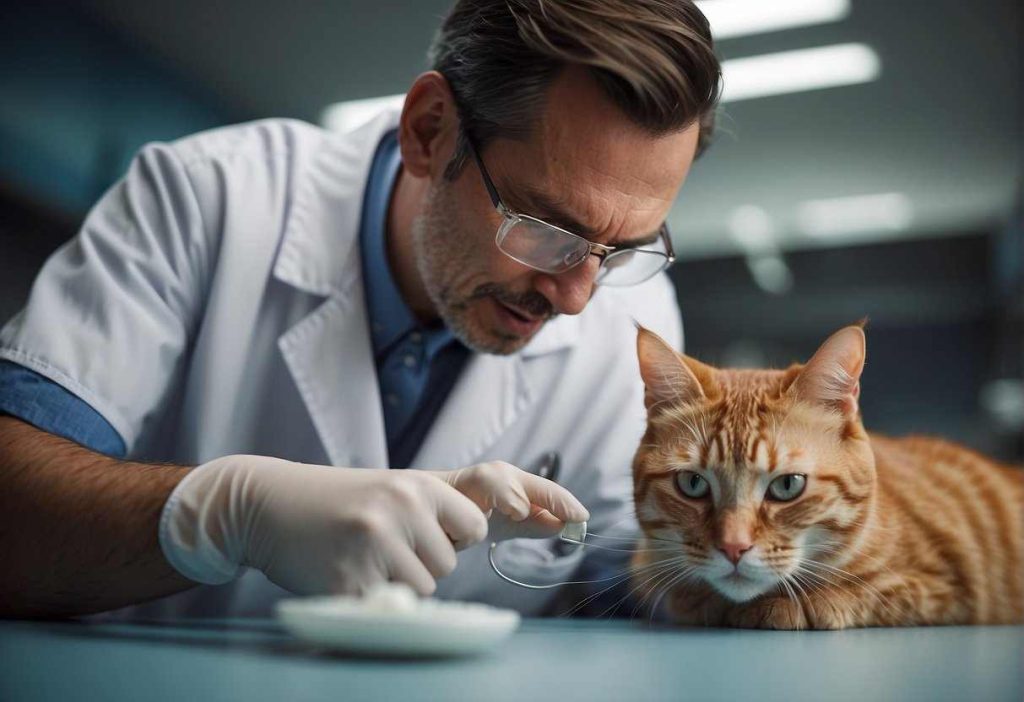
Have you noticed your cat sneezing blood? That can be pretty alarming, can’t it? Well, let’s talk about getting your furry friend the help they need.
Preparing for the Vet Visit
First things first, you’ll want to gather some info for the vet. What have you noticed? How often is the sneezing happening? Jot down any changes in behavior or appetite too. Remember, you know your cat best!
Transporting your kitty safely is crucial. A well-ventilated carrier with a comfy blanket can make the trip less stressful for both of you. And hey, nobody wants a freaked-out furball zooming around the car!
Understanding Diagnostic Tests
The vet might seem like a mystery shopper picking out tests for your cat, but each one has a purpose.
- Bloodwork: To check for infections or blood disorders.
- X-rays: To peek at what’s going on inside, like nasal blockages.
- Endoscopy: A tiny camera adventure up the nose to spot any abnormal growths.
Treatment Options Explored
Here’s where your vet becomes the detective, narrowing down the causes and figuring out the best treatment.
Treatments can range from the simple, like antibiotics for an infection, to the more involved, for conditions like tumors. Your vet will guide you through the specifics for your cat’s condition.
Each sniffle and sneeze tells a story. With professional care, you’re on your way to ensuring your cat’s plot twist is a healthy and happy one.
And always remember, your vet’s there to answer any questions – no matter how small!
Preventive Measures and Long-Term Care
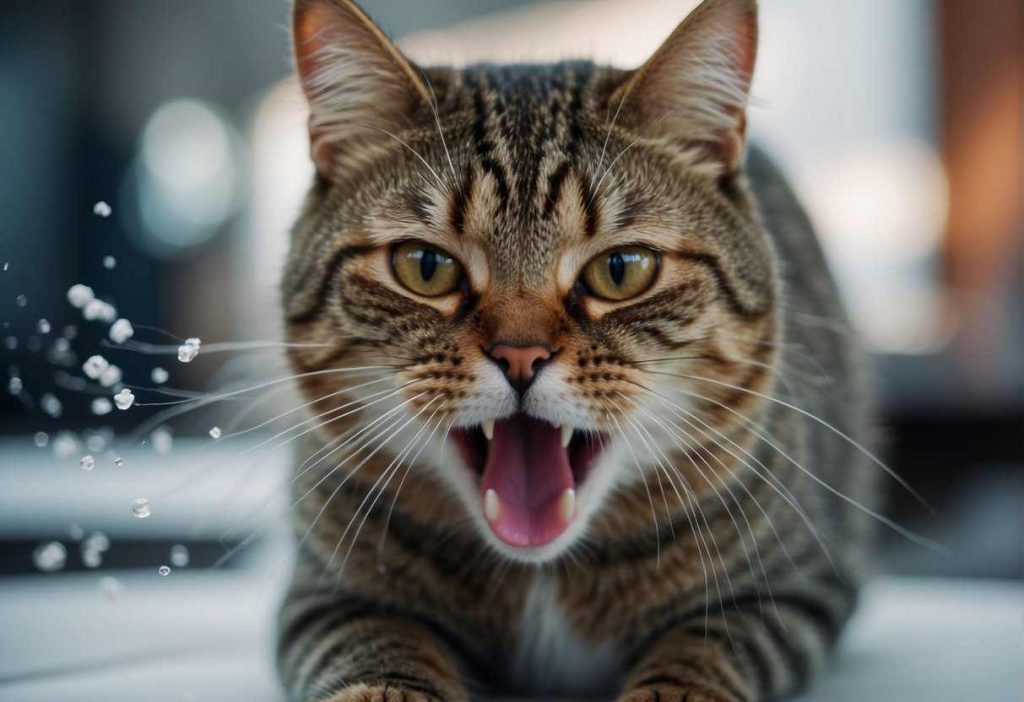
Vaccinations and Regular Check-Ups
Let’s aim for vaccinations yearly or every few years, as advised by your vet. But, don’t just stop there:
- Annual Visits: At least once a year, more if they’re on the senior side.
- Physical Exams: To catch any oddities, from heart murmurs to sneaky tumors.
Environmental Adjustments
Creating a cat-safe haven at home? Top-notch idea! (3)
- Keep it clean: Regularly wipe surfaces to minimize irritants.
- Limit the adventures: Outdoors can be risky, so consider an indoor lifestyle or supervised outings.
Nutritional Support
Just as we watch our diets, so should our cats. A balanced diet equals a strong immune system:
- Quality Food: Protein-rich, low-carb – chef’s kiss for cats! (4)
- Hydration: Water bowls everywhere, because hydration is key. (5)
- Supplements: Chat with the vet first, but there are supplements out there that can bolster the kitty’s respiratory health.
Let’s wrap things up with a little reminder: prevention is always better than cure. So, keep an eye on your furry pal’s health, and you’ll both be purring in contentment!
Managing the Emotional and Financial Impact
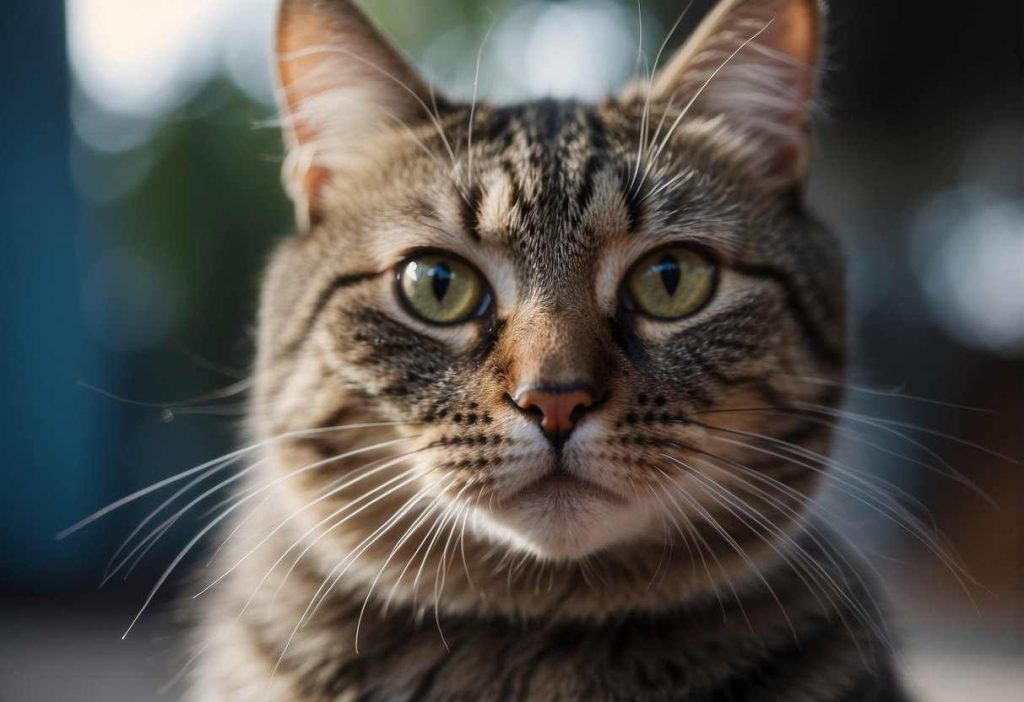
Caring for a furry family member is a joy, isn’t it? But when you see your cat sneeze blood, it can send you into a bit of a tailspin—emotionally and financially.
You’re probably worried, and rightly so, but let’s talk about how to handle this with a cool head and a steady heart.
Supporting Your Emotional Well-being:
- It’s natural to feel stress and anxiety in such situations.
- Remember to take deep breaths; your cat can sense your emotions.
- Reach out to friends or fellow cat lovers for support—they understand what you’re going through.
Navigating Financial Considerations:
Now, let’s look at the practical side—those vet bills. Here’s a quick rundown:
- Planning for emergencies: Start a pet emergency fund if possible. Even a little saved each month can ease future financial burdens.
- Understanding insurance and low-cost care options: Pet insurance might be worth considering, and some clinics offer sliding scale fees based on income. (6)
Here, take a peek at this simple table for budgeting for your cat’s health:
| Potential Cost | Budgeting Tips |
| Initial Vet Visit | Set aside a small monthly amount for vet visits. |
| Ongoing Treatments | Look into insurance or wellness plans. |
| Emergency Fund | Save loose change and add it to this fund. |
Remember, facing the tough stuff is part of loving that whiskered friend of yours, but you’re not alone.
By addressing both the emotional and financial aspects with care—you’ll navigate through this challenge like the cat’s meow. Stay pawsitive!
Real-Life Cases and Personalized Advice
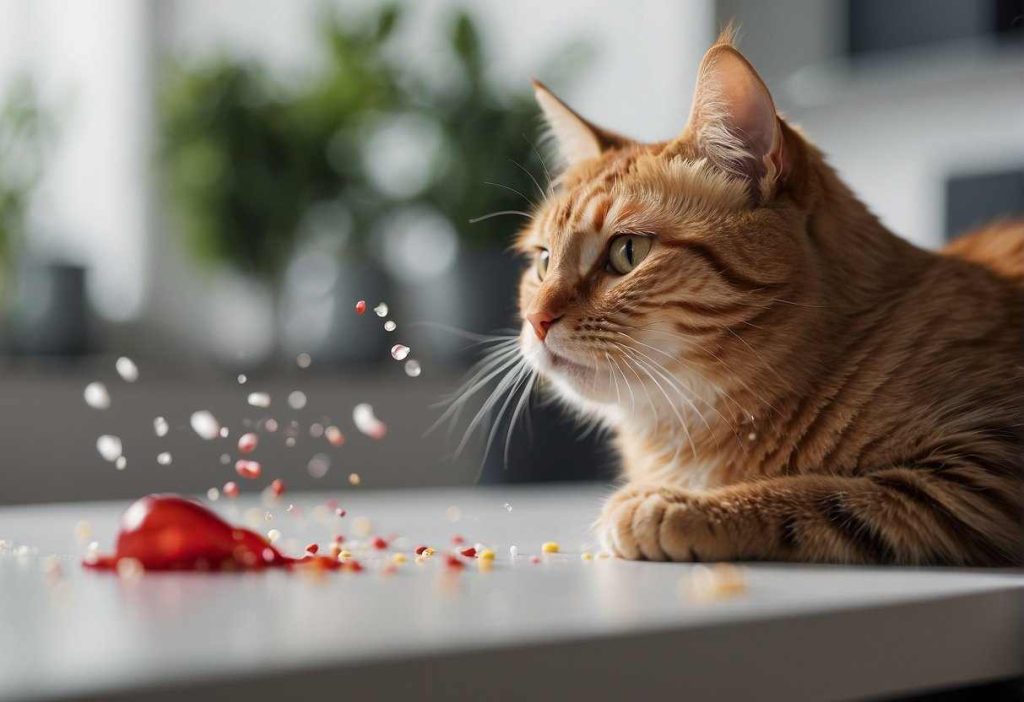
Have you ever been startled by a sudden sneeze from your whiskered friend, only to realize there’s blood involved? Let me assure you, you’re not alone!
Let’s peek at some real-life examples and dish out a sizable helping of advice, courtesy of friendly cat experts.
Misty’s Mystery:
- Symptom: Sneezing blood
- Outcome: Turned out to be dental issues
Oscar’s Ordeal:
- Symptom: Persistent sneezing with blood
- Outcome: Diagnosed with nasal polyps
What does the vet say? Don’t hit the panic button just yet. Often, the cause is less sinister than it seems. Still, it’s essential to take action, as it might indicate a serious issue.
- Have you checked their nose for foreign objects? Cats are curious creatures!
- Did you note any other symptoms, like eye discharge or lethargy? If it’s more than just an achoo, your vet visit just got bumped up the priority list.
Here’s a quick rundown:
- Cold or infection: Common and usually not grave.
- Fungal infection: Requires prompt medical treatment.
- Foreign body: A cat’s sniffing adventure can end at the vet’s.
- Dental problems: Tied to bleeding if teeth or gums are involved.
- Blood clotting disorders: These are less common but serious.
- High blood pressure, tumors, or polyps: A comprehensive check-up is warranted.
Remember, it’s all about being observant and taking a step-by-step approach. If your feline friend’s sneezing colors the day red, take a deep breath and reach out to your vet for the best plan of action.
Because when it comes to your cat’s well-being, you’re the superhero they count on!
Advanced Care Strategies

When to Seek Specialist Care
Indications for consulting a veterinary specialist:
- Persistent bleeding: If the sneezing and blood don’t stop, it’s time to check in with a vet who can dive deeper into the issue.
- Recurring episodes: Frequent bloody sneezes aren’t typical and warrant expert eyes.
- Associated symptoms: Is your cat also lethargic or struggling to breathe? Specialists have the tools and know-how for comprehensive care.
Long-Term Management for Chronic Conditions
Sometimes, sneezing blood can hint at a chronic condition. It’s not the end of the world, though! With a few tweaks, your cat can still purr happily.
Lifestyle adjustments:
- Keep your home free of irritants that might trigger sneezing.
- Consider an air purifier to reduce airborne allergens.
Ongoing medication and treatment plans:
- Medications: Your vet may prescribe meds to manage the underlying causes.
- Regular check-ups: Keeping tabs on your cat’s condition helps to catch changes early. (7)
Remember, with the right support, your cat can continue to enjoy its nine lives to the fullest!
Keep an eye out for troubling signs, consult specialists when necessary, and embrace a managed care approach that keeps both the sneezes and worries at bay.
Quick Recap
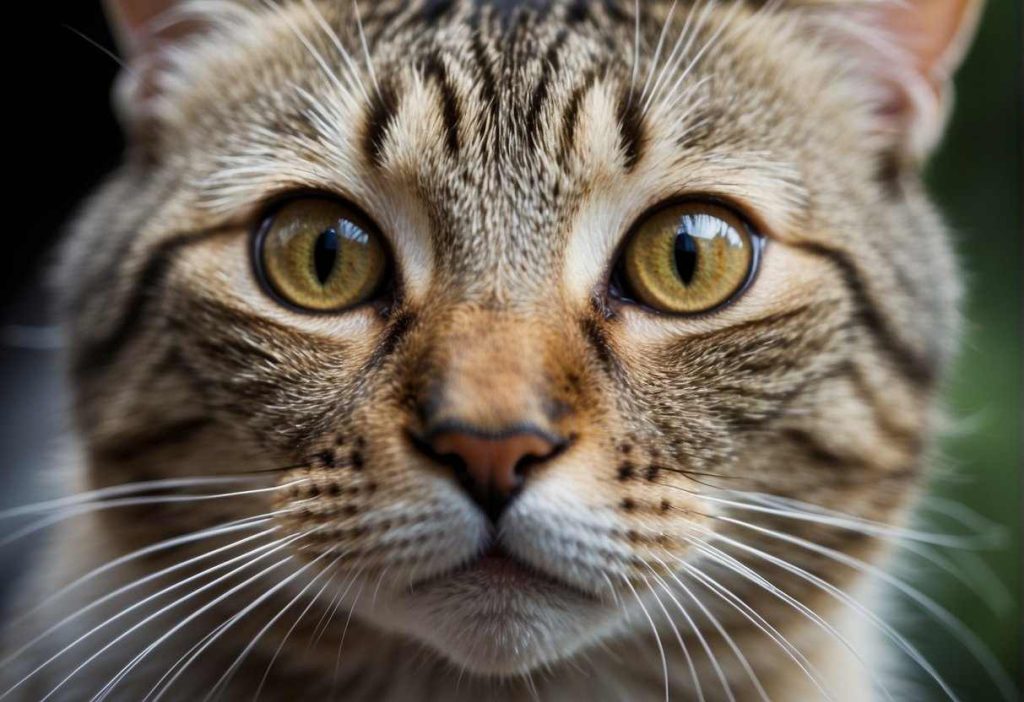
Are you feeling a bit overwhelmed with information? Let’s break down the essentials you need to know if your cat starts sneezing blood.
Key Takeaways
- Don’t Panic: A bit of blood might not be critical, but it is unusual.
- Act Promptly: Consistent or frequent blood when sneezing is an emergency.
Recap of Critical Steps
- Observe: Note the frequency and amount of blood, and look for other symptoms.
- Isolate: Keep your furry friend away from other pets to prevent the potential spread of infections.
- Vet Visit: Schedule an appointment with your vet immediately.
Preventive Measures
- Maintain regular vet check-ups.
- Keep your cat’s living area clean to avoid irritants.
Remember, while some causes may be less severe, others can be quite serious. Your actions can make all the difference.
Additional Resources To dive deeper into causes and treatments, consider these resources:
- Visit reputable websites like Cats.com or Daily Paws for updated information.
- Check out forums on Catster for community support.
Got all that? Good! Your attention to your kitty’s health can help maintain those nine lives. Stay informed, stay calm, and always keep your vet on speed dial for these furry curveballs.
Frequently Asked Questions
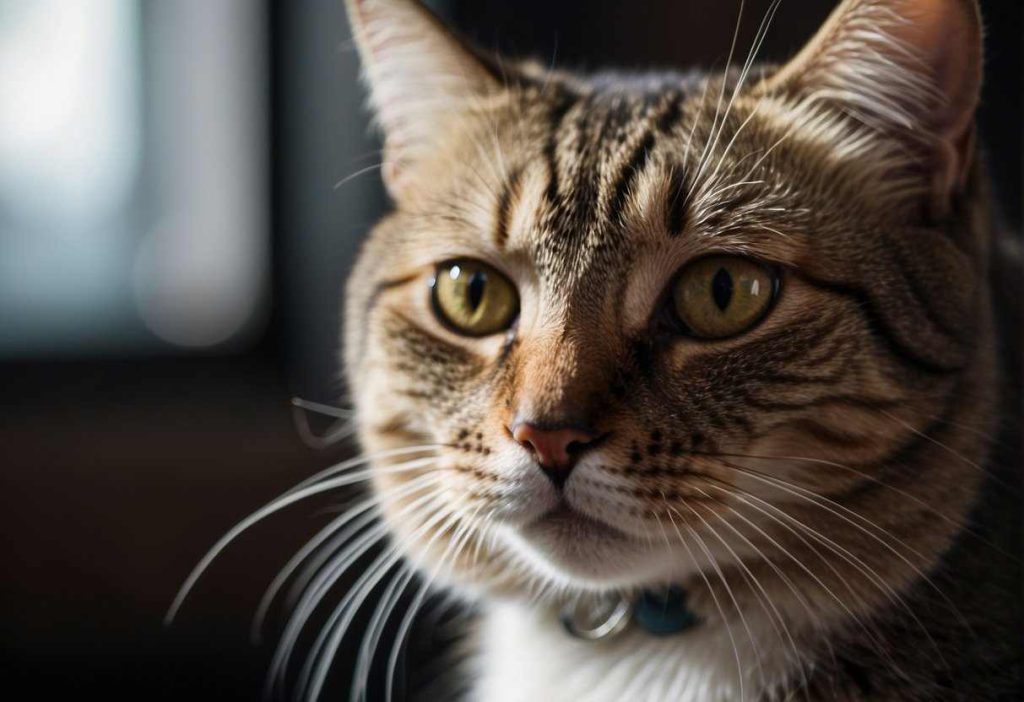
If your cat just sneezed blood, you’re probably feeling worried and full of questions. But don’t fret! Let’s dive right into some answers that will help guide you through this.
What should I do immediately if my cat sneezes blood?
First things first, stay calm. Gently clean your cat’s nose with a soft cloth and remove any debris.
If the bleeding continues, or if it’s accompanied by other symptoms like lethargy or difficulty breathing, contact your vet immediately.
How can I tell if my cat’s bloody sneeze is an emergency?
A single bloody sneeze may not be an emergency, but if the bleeding is persistent or if your cat seems distressed, it’s safer to consult with a vet.
Also, be on the lookout for signs such as labored breathing, excessive sneezing, fatigue, or a decrease in appetite.
What are the common causes of a cat sneezing blood?
Causes can range from the mild to the serious: think nasal infections, foreign bodies in the nose, or allergies.
Other culprits could be dental issues, high blood pressure, or more severe conditions like tumors.
Can a cat sneezing blood be treated at home?
Minor cases, especially if caused by allergies or irritants, can sometimes be managed at home with rest and a clean environment.
However, it’s crucial to first get a vet’s diagnosis to make sure you’re not missing something more severe.
What preventive measures can I take to avoid future incidents of my cat sneezing blood?
Keep your home clean and free of irritants like smoke or strong perfumes.
Regular vet check-ups and keeping up-to-date with vaccinations can also help prevent infections that could cause sneezing blood.
What treatments might the vet recommend for a cat sneezing blood?
Treatment varies and depends on the cause.
Your vet might prescribe antibiotics for an infection, surgery for a foreign object removal, or even medications to manage underlying conditions like hypertension.
What should I know about the financial cost of treating a cat that sneezes blood?
Costs will vary widely based on the treatment required. Simple infections might need just antibiotics, which can be relatively inexpensive.
However, if surgery or long-term therapy is needed, the costs can add up, especially if a bacterial infection is present.
It’s best to discuss with your vet and possibly look into pet insurance for future peace of mind.
- No Account Gambling Enterprise: The Future of Online Gambling - August 2, 2025
- Introduction to Free Slots Machines: The Ultimate Guide - August 2, 2025
- Как вывести деньги с Lucky Jet: подробное руководство - August 1, 2025

